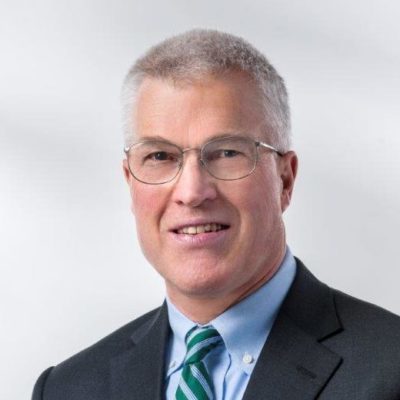James F. Raymond

Law Firm:
- Practices estate planning, business, and real estate law
- Licensed to practice in Maine, Massachusetts, and New Hampshire
- Represents farmers and food entrepreneurs
James says:
“In the old days, a lawyer in practice learned a lot of different things—business, probate, litigation . . . and now there is more of an emphasis on early specialization. But if you’re going to represent a business like a farm that will have a variety of problems, you can’t afford to have a variety of specialist lawyers. You need to have a breadth of knowledge.”
James’ Background
Throughout his 30-year legal career, James Raymond has assisted numerous farmers by facilitating land deals and creating estate plans. James grew up in farm country and when he became a lawyer, he wanted to serve farmers because he believes they play an important role in the community. He earned his Bachelor of Arts degree from Wesleyan University and then his JD from Boston College Law School. After graduating from law school, James worked at a big law firm in Manchester, where one of his first cases was a large environmental case involving a dam project. In such cases, he advises, “you don’t need a good environmental lawyer, you just need a good lawyer—you need someone with good business skills and good people skills.” Although James recognizes that “there is something special about farms,” he notes that attorneys can develop the skills they need to serve the farming population by practicing in other areas of the law. When advising young attorneys who want to serve farming and food entrepreneurial clients, James says, “In the old days, a lawyer in practice learned a lot of different things—business, probate, litigation . . . and now there is more of an emphasis on early specialization. But if you’re going to represent a business like a farm that will have a variety of problems, you can’t afford to have a variety of specialist lawyers. You need to have a breadth of knowledge.”
Get out of the office
Developing experience and knowledge in many areas of the law has another advantage. Due to his skill base, James serves a variety of different clients at his firm—some who ask him to handle multi-million dollar deals and some who need legal services but cannot afford the fees. He engages in different kinds of commercial work because farmers and small restaurants are usually “pretty thinly capitalized” and often cannot pay for legal services at market rates. Having a variety of clients helps to cover the law firm’s costs.
James advises new lawyers who want to serve farm and food entrepreneurial clients, “Go to the business. Go to the people. You have to do that if you’re going to do this work. Don’t sit in your office all the time—get out there.” He stresses that farming is “not an academic practice—it’s hands on” and that, therefore, attorneys need to “at least have a sense of this.” He also recommends that all attorneys “develop the skill to listen. Lawyers like to talk. Develop the skill to listen.”
The Center for Agriculture and Food Systems is an initiative of Vermont Law School, and this toolkit provides general legal information for educational purposes only. It is not meant to substitute, and should not be relied upon, for legal advice. Each farmer’s circumstances are unique, state laws vary, and the information contained herein is specific to the time of publication. Accordingly, for legal advice, please consult an attorney licensed in your state.
